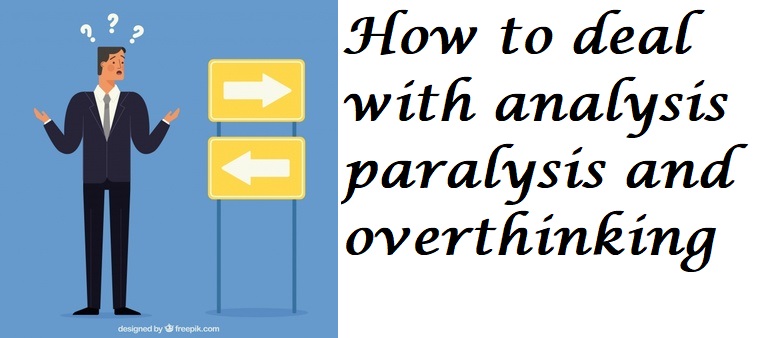Have you ever found yourself in this incessant case of analysis by paralysis? It can feel like whenever you have a decision to make you just get stuck in a rut, circling round and round all possible options and don’t seem near to a final decision. Thirty minutes elapses, 60 minutes, then even 120 minutes and you’re still in same position regarding the decision at hand. In fact, on top of that you may even want to distract yourself to let time pass.
Does that sound familiar?
If so, perhaps you’re not alone. There’re times I find myself struggling in that wheel and trust me I know how frustrating that can be. This behavior had probably caused me loss time and opportunities and so I actively have been working to trounce that villain from my life.
Reasons for analysis paralysis
There’re a number of reasons we battle this analysis paralysis but from my experience so far the main reason is fear. Fear of the unknown, fear of criticism, fear of failure (big one). We’re afraid about the outcome of our decision especially when it’s a novel experience. And don’t get me wrong, fear in most cases can be legit. Especially when it’s an unprecedented move you’re about to take. The fear may just be a sign that we haven’t done due diligence and research to take the action. So that’s indeed a good time to STOP and address the fear.
Another possible reason is lack of confidence. When we don’t trust our own judgement or decision making . This can stem from failed attempts in the past which we still keep dragging into the future and haven’t made peace with. So, it’s profitable to let go of those past failures; they don’t defined us and mustn’t mar our identity. The good thing is that we know what doesn’t work and so can try something else. We either learn or succeed – but we never fail unless we stop trying.
We either learn or succeed – but we never fail unless we stop trying.
Possible technique(s) to combat analysis paralysis
Interestingly, for years I’d adopted the pros-and-cons technique to cut off analysis paralysis during my decision making. The technique basically entails penning down all the reasons for and against the intended action.
For example, one time when I had to decide whether or not to enroll in a course, I basically whipped out a booklet then drew a line in between a page to section out a left and a right column. The left was marked for ‘Pros’ while the right ‘Cons’ , then I simply brainstormed reasons and threw them into the respective columns. Afterwards, I weighed the options based on my main objective/goal then tried to listen to that still small voice to guide me in deciding. That usually worked for me for majority cases (I don’t recall getting screwed following that but I am not saying it’s 100% bullet proof)
Apart from that, in the course of learning about more powerful techniques to combat analysis paralysis, I also came across a risk management-based approach. (I give credit to J.T. Foxx (business coach, best selling author and entrepreneur) as I’d first gleaned this from one of his live talks I’d attended.)
For this one, again with the pen and paper I write out the decision to be made on the top of the sheet of paper. The enumerate my points under 3 sub headings namely:
- What’s the worst thing that can happen if I make this decision?
- What’s the best thing that can happen if I make this decision?
- What’s the most likely thing that’ll happen if I make this decision?
Then count … 3! 2! 1!
And decide following intuition (or still small voice). And according to J.T. 99% of decisions made by the gut/intuition are right.
When it comes to decision making, I feel it’s very beneficial to follow a structure otherwise we’ll get stuck overthinking. Trying to make a decision with the mind/logic is what leads to overthinking. On the other hand, taking a decision with the heart may not be the best because emotion-driven decision can be misleading.
The bottom line obviously is that having a technique you can apply to your decision making can be undoubtedly helpful. And the more you apply such, the more confident and in touch you feel with it.
How do you deal with overthinking and analysis paralysis?
To your victory over analysis paralysis/overthinking!
